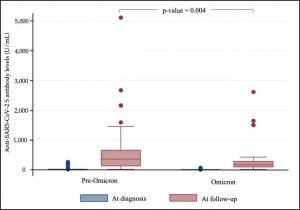The COVID-19 pandemic has impacted millions worldwide, including children, who generally experience milder symptoms. However, understanding the immune response in children is critical, especially as new SARS-CoV-2 variants emerge. A recent observational study from Thailand examined antibody levels in unvaccinated children hospitalized with COVID-19, comparing responses during the pre-Omicron and Omicron variant eras. Findings showed that children infected during the pre-Omicron era (primarily Delta variant) had significantly higher antibody levels than those infected during the Omicron period, indicating a weaker immune response to Omicron.

Fig 1. Anti-SARS-CoV-2 levels at diagnosis and follow-up in children infected with COVID-19 during pre-Omicron and Omicron era.
The study involved 119 children, divided into two cohorts based on infection timing. Children with pre-Omicron infections exhibited a robust antibody response, whereas those infected with Omicron had lower antibody levels at follow-up. This variation likely reflects Omicron’s immune evasion capabilities, which reduce the body’s ability to mount a strong antibody response. While Omicron is associated with milder disease, the weaker immune response in children raises questions about potential immunity gaps in this age group, emphasizing the importance of vaccination.
Interestingly, the study found no correlation between antibody levels and COVID-19 severity in children, a contrast to adult cases where higher antibody levels often correlate with disease severity.
This suggests that children’s immune responses to SARS-CoV-2 are distinct, possibly due to differing immune system dynamics or lower disease severity. Furthermore, natural infection, particularly with Omicron, may not provide lasting immunity in children, supporting the case for vaccination even in previously infected individuals.
This study underscores the importance of monitoring antibody dynamics in children and highlights the need for pediatric vaccination strategies tailored to current variants. Omicron’s limited immune activation, additional measures may be necessary to protect children and sustain immunity over time.
Summary by Faith Oluwamakinde










